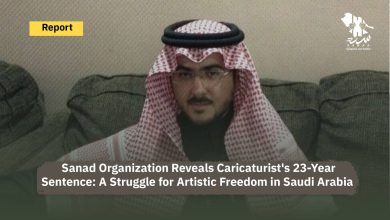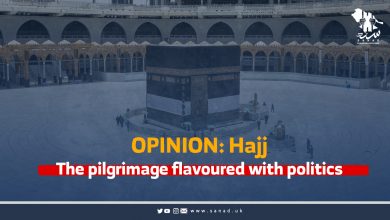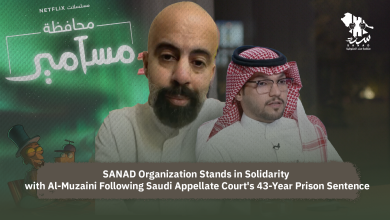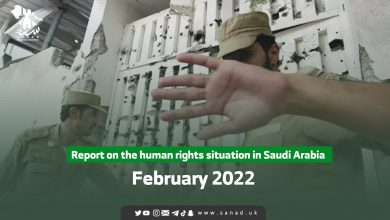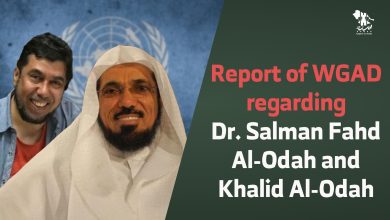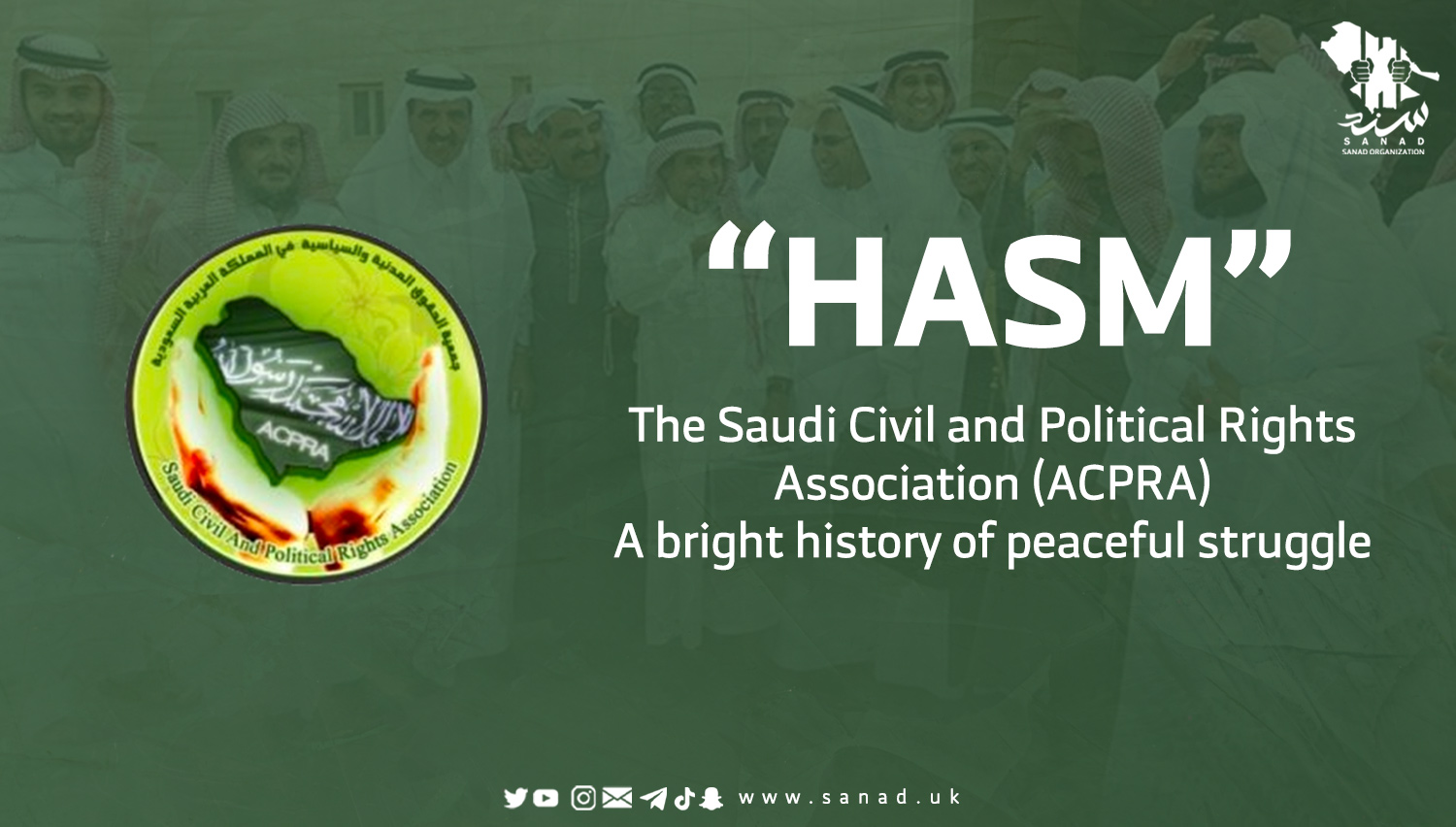
“HASM”: The Saudi Civil and Political Rights Association (ACPRA)
A bright history of peaceful struggle
Read the full version of Sanad’s Report on HASM here.
Introduction
This report focuses on the case brought by a group of human rights activists in Saudi Arabia that led to the establishment of Saudi Arabia’s most famous civil rights body, the Saudi Civil and Political Rights Association (ACPRA) or “HASM”. It is an initiative by a group of 15 individuals from different backgrounds, with the aim of defending the civil and political rights of the people of The Kingdom. What characterised this group and its project was the focus, clarity of purpose, and determined pursuit of this goal with everything that they had been given. HASM was ostensibly a thorn in the throat of the Saudi Arabian Government, and bitterly condemned the Saudi Arabian authorities’ practices and violations in relation to the issue of arrests. In their criticisms they focused on the Ministry of the Interior and Investigation, which represented the spearhead in terrorising the people and intimidating them from demanding any rights or even defending themselves against the violations perpetrated by these security institutions and their aggression. For as long as Saudi Arabian security forces have enjoyed broad powers that allow them to arrest any and all of those simply under suspicion and torture them with impunity and lacking any accountability. Just as their use of said broad powers is not restricted to cases of terrorism suspects but rather against any critic of the authority be they related to state security or even civil criticism. HASM has stood up steadfastly against the exploitation of “anti-terror” legislation and the expansion of legal recourse to act against mere peaceful criticism of the authority and the classification of those associated with said criticism as criminals against the state. The Saudi Arabian authorities have therefore responded in a harsh and brutal manner against HASM in particular, as with all civil rights initiatives whose members have all but been reduced to prisoners and victims of murder within the authority’s prisons.
So on the second anniversary of the death of Dr Abdullah Al-Hamid, one of Saudi Arabia’s most prominent reformers and one of the founders of HASM, Sanad opens the case file once more to highlight the heroes of HASM who paid with the blooms of their lives and their reputations in aid of defending human rights in a country of tyranny, in order that future generations may enjoy life in a country that respects their rights and freedoms.
Establishing HASM
The Saudi Arabian Civil and Political Rights Association or “HASM” was founded on the 12th of October 2009 by a group of academics and human rights activists. Its founding statement proclaims that the reason for its creation was the grave violations of fundamental human rights in the country, which have been on the rise since the Gulf War. In light of people having become more aware of their rights, government oppression increased as a result of this, driving thousands of young people to the regime’s prisons. HASM also adds in its statement, that due to the suppression of peaceful action manifested by “The Memorandum of Advice” and “The Letter of Demands” and the establishment of “The Committee for the Defence of Legitimate rights” violence has emerged in the country in the form of bombings in Riyadh and Khobar. When the government took it upon itself, without mandate or participation from the people, to engage in fateful politics and decision making on a domestic and international level, came the events of the 11th of September and its consequences. The solution to this according to HASM is the establishing of political parties and groupings, and for them to operate openly under the sun and out in the open air.
HASM also aims to emphasise the guarantees of the fundamental rights of human beings, be they civil or political, it has also sought peaceful advocacy of a “constitutional monarchy” with an independent judiciary, an elected parliament and guaranteeing the freedom of fair litigation in the country. HASM has also worked hard to document the cases of human rights violations in the country, and support those affected through prosecuting officials and enabling those affected to communicate with non-governmental human rights organisations and raising their awareness of the necessary procedures.
HASM Members
You can find the full list of HASM’s members in our report here.
Correspondence to the King
HASM sent a direct letter to King Abdullah in October of 2010 requesting permission to establish an association that will focus on enlightening civil society; and human rights, such as; freedom, justice equality and citizenship, pluralism, consultation, energising the role of women, the altruism of the peaceful approach to reform and the rejection of violence, tolerance and open dialogue with dissenting opinions, transparency, integrity and fairness. This is in order to expand, root and settle the enlightenment of civil society and human rights as the only solution to prevent all forms of violence and extremism.
They were waiting for the issuance of the NGO system’s decision in order to declare their activities officially and systematically, but they had to address the king directly by way of an open letter because the NGO system was obstructed by high level state entities, in an effort to stop and disrupt human rights activity in the state and to block its progress. HASM mentioned in their mission statement that “the aim of not establishing any entity to organise NGOs is to destroy the civil society movement in and of itself”. In addition to this, civilian and human rights activists have been hindered and intimidated to discourage them from establishing a number of committees such as; the Saudi Arabian Civil Commission for Human Rights in 2005, and the so-called “Jeddah Reformists” and others, where not only have their requests been delayed and manipulated, but were rather threatened beforehand by the Assistant Minister of the Interior, that the King has ordered these groups to desist from their requests for the establishment of these civil societies in the first place.
In their address to the King, HASM also noted that the right of the State to supervise the organisation of associations does not eliminate the right of individuals to establish them, and if the handicapping of reform is successful in delaying the organising of associations, this does not eliminate the right of individuals to create them, for the role of the government is or organise coordinate and supervise, not to abolish the establishing of rights. Furthermore, this handicapping of reform efforts not only prevented civil rights activity, but also fabricated terrorism charges against human rights activists, confirming that those who are handicapping reform efforts use religion and the moniker of the war on terror, not only to destroy human rights, but in order to criminalise its advocates, then maim and stifle them in the abyss of incarceration
The association ended its famous address to King Abdullah, with reference to when the King personally announced that he would be the patron of truth and justice in a previous address, that they hoped he would be successful in consecrating truth and justice. And that they did not simply have a view to offer moral support, but rather they were –also- looking to offer financial support in the context of the state’s own campaign against violence and extremism. For this cannot occur without promoting of the values of justice, consultation and human rights and its means
But the government’s response to this was not promising, and the repression of HASM’s organisation began in early 2011, when prominent activist Mohammad Al-Bajadi, of the founding members of HASM was arrested, following a peaceful vigil in front of the Interior Ministry building by the families of detainees. In 2012 Al-Bajadi was sentenced to four years in prison by a court that lacked even the most basic standards of justice, where he was denied legal counsel.
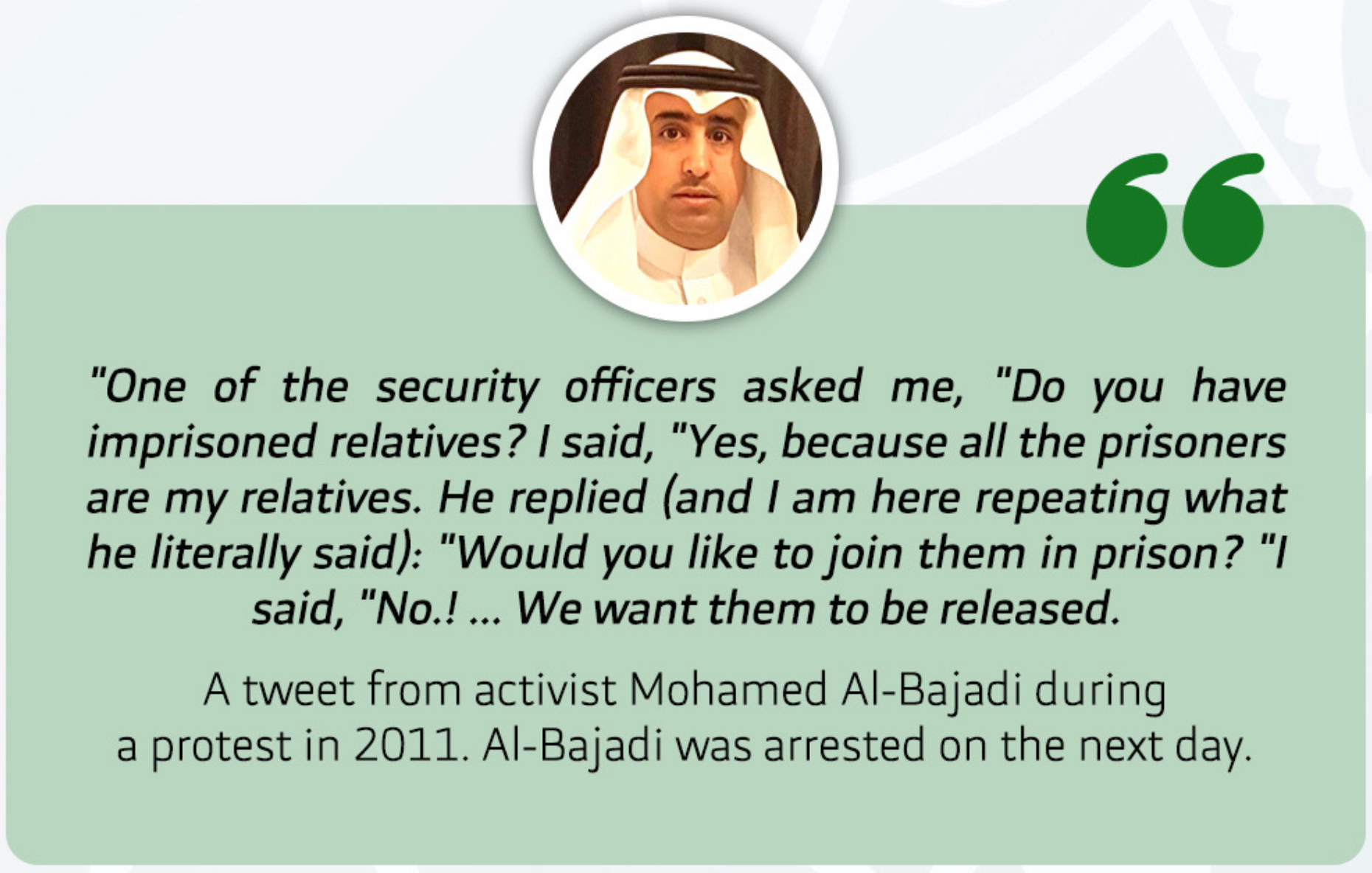
HASM trials
The serial prosecution of HASM members from long ago continues to this day. As is the custom of the Saudi Arabian judiciary, it retries those who it wishes, increasing their sentences, and may even arrest them again even after their release at the end of their sentence, as in the case of Mohammad Al-Bajadi and Omar Saeed. The trial hearings of HASM members had always enjoyed media echoes in society as a result of the intense discourse between HASM members and the judiciary. Some of these hearings were open to the public before the trial hearings were made to be carried out entirely in secrecy.
After the trial of activist Mohammad Al-Bajadi, the trials of the remaining HASM members began with hearings for Dr Abdullah Al-Hamid and Dr Mohammad Al-Qahtani in mid and late 2012, they were then sentenced in 2013 by Judge Hammad Al-Omar, to 11 years in prison for Al-Hamid, and 10 years for Al-Qahtani. With the list of charges against them including several charges, most notably; participating in the founding of an unlicensed association, seeking to undermine state policies, inciting international organisations against Saudi Arabia, and mobilising public opinion against security institutions and senior officials whom it accused of several human rights violations including; murder, torture and enforced disappearance, branding the Saudi Arabian Government as a police state, and accusing the judiciary of injustice, questioning the integrity and conviction of the country’s top religious scholars, insulting state officials and questioning their integrity, and seeking to sow discord and division in society; among others. The prosecution also demanded “a severe and disciplinary punishment that would act as a deterrent for them and to ban them from any travel”
For more details on this, read the full report here.
Violations
Like other human rights and political activists in Saudi Arabia, HASM members have been subjected to numerous violations and obstacles in the course of attempting to defend human rights and political prisoners in particular and to seek accountability from the authorities as a consequence of their crimes against political prisoners. One such form of violation is the prohibition of travel during and after the unfair trials to which they have been subjected. The Saudi Arabian Interior Ministry banned the travel of all members of the group from moment the association was founded. This unjust ban led to the death of one of its members, Muhanna Al-Falih, who wished to travel abroad for medical treatment. As a result of his poor health and lack of access to the required health care at home, he passed away in 2011. The rest of the members of the association were informed of the decision to ban travel only through border crossings and without prior notices or judicial orders, where appeals or grievances can be recorded on these decisions. These arbitrary travel bans come in the context of administrative sanctions imposed by the authorities on activists as a form of punishment and intimidation due to their human rights activism.
Among the violations to which members of HASM were consistently subjected, even before they were arrested were; organised media smears of activists who were members of the association, sympathisers thereof or lawyers who were sympathetic with the association. The government smear campaigns of activists are an attempt to apply societal pressure, seeking to undermine their mental image, misrepresent the objective and work of these human rights groups, and claim that these activists are in fact operating on behalf of foreign outside organisations.
One of the most prominent violations they have been subjected to has been violent and arbitrary detention. When all that would have been required of the authorities was an official summons for them to attend. Most members of the association were forcibly concealed for several weeks or even months before being brought to trial. Mohammad Al-Bajadi was forcibly concealed for weeks by clandestine security agents without a warrant for his arrest. There was no news of him before the authorities allowed him to make a phone call to his wife. His family was not allowed to visit him for a period longer than six months. This was also the case with a number of members, such as; Saleh Al-Ashwan and Sheikh Suleiman Al-Rashoudi.
Other activists who supported HASM’s case and worked to defend them in their trials or worked to defend them in the media were also subjected to violations. Such as the prominent human rights activist Waleed Abu Al-Khair , who was a lawyer for a various members of HASM, and the activist Faadil Al-Munasif, who were arrested in 2014 and sentenced to 15 years in prison.
And the most prominent violation against any HASM members, which is still ongoing is; the death of the most prominent human rights activist, and icon of peaceful resistance in Saudi Arabia and one of the founders of the association, Dr Abdullaah Al-Hamid, inside the prison where he was held in 2020. Where his death which resulted from deliberate medical negligence on the part of the authorities, was a shocking turning point in the struggle for human rights in the country. Dr Al-Hamid suffered from various medical conditions and was restricted from medication and his grave medical condition was not treated with the urgency it was due. And we hold the Saudi Arabian authorities entirely responsible for the death of Dr Al-Hamid, which could be elevated to the crime of murder, given the circumstances in which he suffered and the false charges that accompanied his arrest on several occasions simply as a consequence of his peaceful human rights activism.
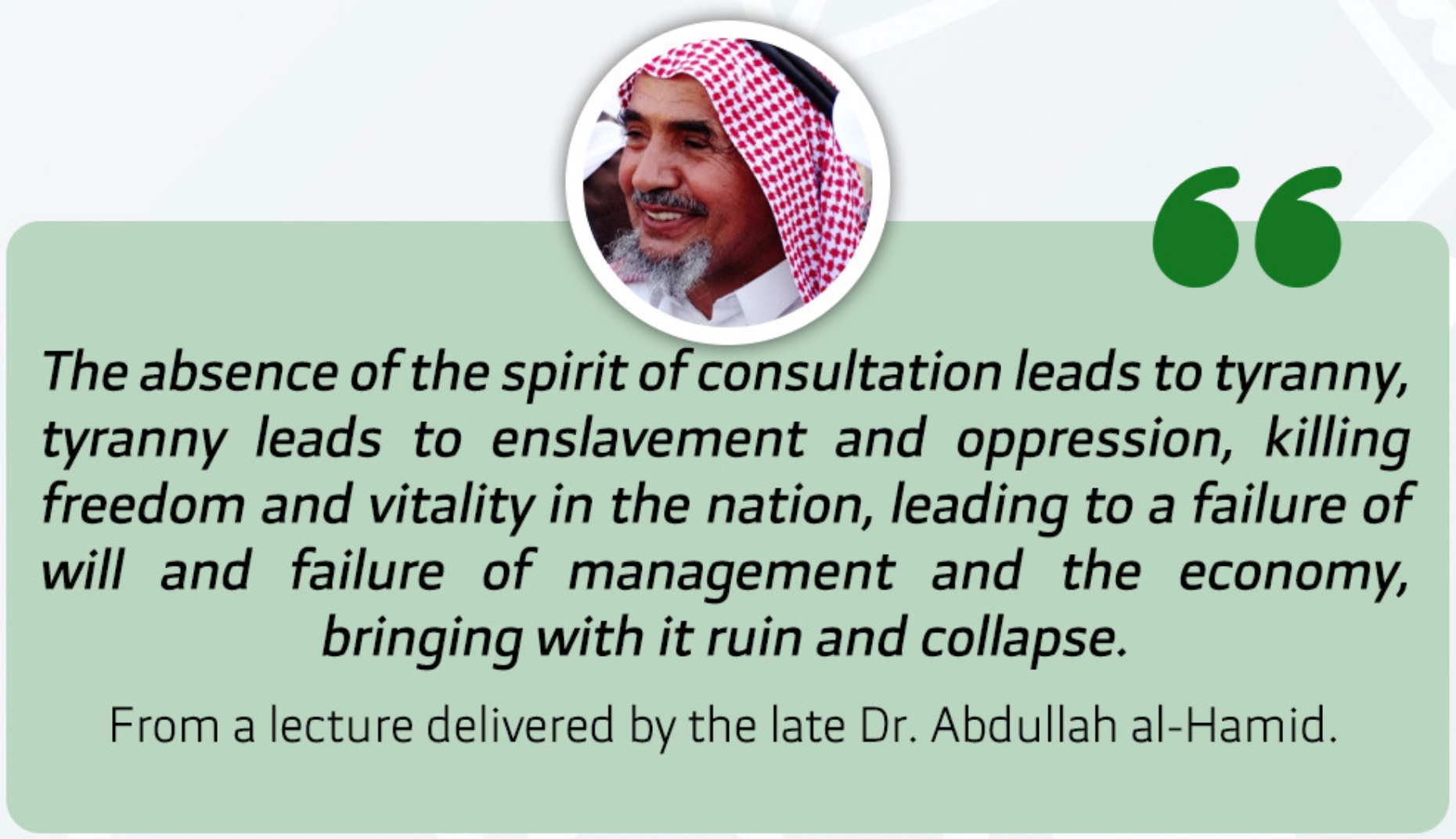
Conclusions and Recommendations
The heroes of HASM have demonstrated that there are those who live for a cause in which they believe, and that some of them also die for that cause. Two years after the death of HASM icon, Dr Abdullah Al-Hamid inside a detention facility, and with the remaining HASM members still serving long prison sentences at time of writing, our demands for the immediate release of the rest of the members of the association, and the opening of an investigation into the circumstances surrounding the death of Dr Al-Hamid in order to hold those responsible accountable. There is no doubt that HASM has won the challenge against the government by successfully making the issue of human rights and fundamental freedoms a public issue rather an issue for the elite. And it succeeded further when its objectives coincided with peoples’ concerns and awareness, and it succeeded unambiguously when the people began becoming aware and the man in the street discusses political prisoners upon taking a personal stake in their issue.
The greatest achievement made by HASM and its members is that this people have not forgotten their freedom, and will neither leave it nor relinquish it in exchange for a livelihood, and that this people of the land of the two holy mosques seeks freedom and justice and rights as are sought by all free people; rather they are willing to do what others will not in order to achieve this. Dr Al-Hamid and his companions will remain immortal in the history of the struggle for freedom, and the names of those heroes who planted the seeds of reform in our country will remain etched in the chest of every free man. The highest loyalty to the souls of the heroes who left us, and to the free people who are still behind the bars of tyranny, is to enliven the cause and goal they sought, and for the free to continue to fight, in order to protect freedoms, fight corruption and tyranny, and not to surrender to the tyrant who has become aware of the danger to his existence presented by these reformist societies.
Sanad calls upon the Saudi Arabian authorities for:
- Immediate and unfettered release of all political detainees, including members of the HASM association, currently detained; Dr Abdul Rahman Al-Hamid, Dr Mohammad Al-Qahtani, Dr Abdul Karim Al-Khidr, Mohammad Al-Bijadi, Issa Al-Hamid, Fawzan Al-Harbi, Abdul Aziz Al-Shabili and Omar Al-Saeed, all of whom are serving prison sentences for expressing their opinion and calling for the protection of human rights in the county, or exercising their rights to establish civil societies or peaceful assembly.
- A transparent investigation by an independent body into the death of Dr Abdullah Al-Hamid, who died inside his detention facility as a result of deliberate medical negligence. And to hold accountable those responsible for this heinous crime.
- Lifting travel or movement restriction on all activists including HASM members, and respecting the human right to freedom of movement and travel.
- Cessation and direct abolition of judicial decisions and charges against human rights activists, including members of HASM who suffer in detention because of these provisions.
Full PDF version of Sanad’s Report on HASM.


